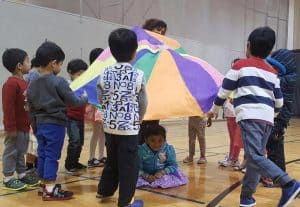Nighat Peracha has been teaching Pre-K at RARE Learning for almost 5 years. In our chat with her, she offered some sound advice to parents who wish to enroll in the program. Here is some of what she had to say about the RARE Learning Pre-K program.
1. A child’s progression at RARE Pre-K
The children that enroll in the RARE Pre-K programs are from the age group of 3-5 years. Nighat explained that these children haven’t been to school and this is their first academic experience, so they have a lot to learn. It is a new environment for them with new challenges to face. Students have much to learn, from recognizing the alphabets to holding a pencil.
The RARE Pre-K program is a 3-hour program, twice a week. During the program children are taught the alphabets, number recognition, and names of days, and they participate in other interesting activities. One hour is devoted to writing. Teachers focus on one-on-one interaction with the kids.
Nighat says that a child’s progression varies according to age. Usually it takes about 2 months for progress to become visible. At the end of 3 months, children can recognize letters and numbers, learn the correct technique of holding a pencil, and use crayons. The program also has many activities, and a theme is followed for the month, be it continents, seasons, hygiene, plants, animals, dinosaurs etc. This makes learning more interesting and enjoyable for the students.
Nighat states that every child’s progress is per their individual potential, capabilities and age group.
2. Parent’s involvement
Kids get to bring their completed class work with them each day. This includes anything they may have learned or made during the class. In this way parents get to see their child’s progress and achievements daily. Nighat advises parents to talk to their kids at home about what they have learned and accomplished during the hours at RARE Pre-K. This not only keeps the parents involved in their child’s progress, but also builds up the child-parent relationships.
3. RARE Pre-K or Montessori?
In Nighat’s opinion, RARE Pre-K is a very introductory program and has shorter hours than Montessori. However, RARE Pre-K has a very good curriculum and students receive more information. A lot of academic skills such as reading, writing, and math are developed. RARE Pre-K Programs are discipline focused, and emphasize academics over play.
4. Advice for parents who are considering enrolling in the RARE Pre-K program
Nighat works very hard to get children started, and to enhance their academic skills at a very young age. If parents are looking for a good program, and if they want their kids to start on a good footing for kindergarten, then she would recommend the RARE Pre-K program to them. She would certainly recommend it for her own family, as it sets a strong foundation for students at an early age.
5. A success story
For Nighat, a 5-year-old student Jay is a success story. Jay started the program in September. When he joined, he could not hold a pencil and had no letters and number recognition. He required extra care, attention, and guidance. Three months into the program, Jay was able to write numbers from 1-10 with the right formation. “He now comes to class with a happy smile, so much confidence and love” says Nighat. When he started at RARE Learning he was a shy boy and didn’t know how to answer. Now he talks in the class, remembers things, and is confident and interested in learning. He seeks appreciation. His parents have been registering him every month.
Nighat has 20 years of experience as a teacher and she specializes in teaching 3-5 year olds. The fact that she can make a difference in a child’s life is what she finds most rewarding as a teacher. Even though she feels teaching is more challenging these days, she thrives on the self-satisfaction that she is doing something good.








